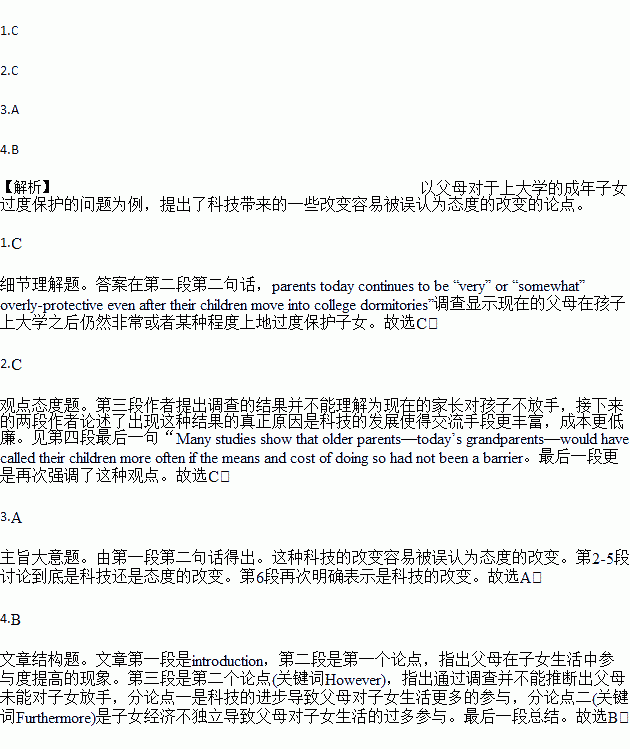题目内容
Technological change is everywhere and affects every aspect of life, mostly for the better. However, social changes brought about by new technology are often mistaken for a change in attitudes.
An example at hand is the involvement of parents in the lives of their children who are attending college. Surveys (调查) on this topic suggests that parents today continue to be “very” or “somewhat” overly-protective even after their children move into college dormitories. The same surveys also indicate that the rate of parental involvement is greater today than it was a generation ago. This is usually interpreted as a sign that today’s parents are trying to manage their children’s lives past the point where this behavior is appropriate.
However, greater parental involvement does not necessarily indicate that parents are failing to let go of their “adult” children.
In the context (背景) of this discussion, it seems valuable to first find out the cause of change in the case of parents’ involvement with their grown children. If parents of earlier generations had wanted to be in touch with their college-age children frequently, would this have been possible? Probably not. On the other hand, does the possibility of frequent communication today mean that the urge to do so wasn’t present a generation ago? Many studies show that older parents—today’s grandparents—would have called their children more often if the means and cost of doing so had not been a barrier.
Furthermore, studies show that finances are the most frequent subject of communication between parents and their college children. The fact that college students are financially dependent on their parents is nothing new; nor are requests for more money to be sent from home. This phenomenon is neither good nor bad; it is a fact of college life, today and in the past.
Thanks to the advanced technology, we live in an age of bettered communication. This has many implications well beyond the role that parents seem to play in the lives of their children who have left for college. But it is useful to bear in mind that all such changes come from the technology and not some imagined desire by parents to keep their children under their wings.
1.The surveys inform us of______.
A. the development of technology
B. the changes of adult children’s behavior
C. the parents’ over-protection of their college children
D. the means and expenses of students’ communication
2.The writer believes that__________.
A. parents today are more protective than those in the past
B. the disadvantages of new technology outweigh its advantages
C. technology explains greater involvement with their children
D. parents’ changed attitudes lead to college children’s delayed independence
3.What is the best title for the passage?
A. Technology or Attitude
B. Dependence or Independence
C. Family Influences or Social Changes
D. College Management or Communication Advancement
4.Which of the following shows the development of ideas in this passage?
I: Introduction P:Point Sp: Sub-point C: Conclusion
A.  B.
B. 
C.  D.
D. 

